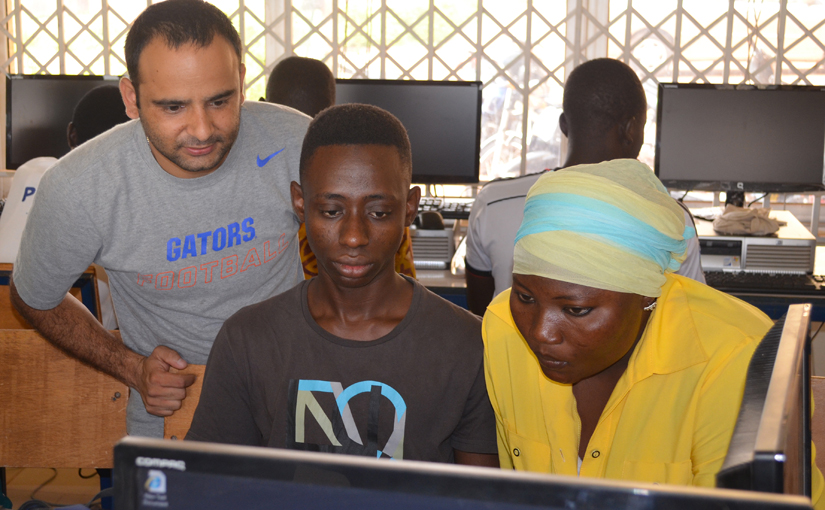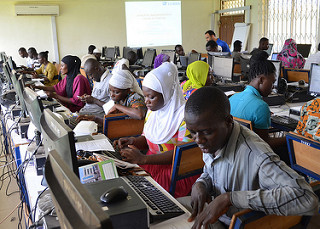
A version of this article originally appeared in the Feed the Future newsletter.
In a classroom in Ghana, graduate student Dev Paudel from the University of Florida bent over computers with students and research assistants as they learned the basics of R, a free, open-source programming language for statistical analysis that he had installed on the computers earlier that week. As participants in this Kayaba Management Foundation training, the class members would next analyze the results of a needs survey of more than 300 farmers and vegetable vendors from nearby communities. Their goal?
“If we can use state-of-the-art statistical tools (including R) in Ghana, we can generate research findings that would be accepted by both policy makers and the international investor community,” said Hussein Yunus Alhassan, CEO of the Kayaba Management Foundation and chief instructor at Tamale Polytechnic. His new foundation is laying the groundwork for locally led research that supports the horticulture sector in northern Ghana, markets for horticulture value chains, and women’s empowerment.
Though only a graduate student himself, Paudel has several years of experience with statistical analysis software from his work on plant breeding, as he earns his doctoral degree in agronomy. In addition to his plant breeding focus, Paudel is pursuing a career in international development, in part because of his experiences as a horticulture development officer in his home country of Nepal.

Paudel’s work in Ghana — including his first trip to Africa — is part of the Trellis Fund, an innovative model that pairs knowledgeable U.S. graduate students with organizations engaged with local farmers in developing countries. The Trellis Fund is a product of the Feed the Future Innovation Lab for Collaborative Research on Horticulture, led by a team at the University of California, Davis.
The Horticulture Innovation Lab’s two main goals for the Trellis Fund are complementary:
- strengthen smaller organizations with the horticultural expertise that a graduate student can provide, and
- provide experience to the graduate student that could expand career horizons toward international development
The connections with smaller organizations and young professionals also strengthen the Horticulture Innovation Lab’s network for future projects.
“Trellis promotes horticultural science to organizations that are often smaller than we might otherwise work with. They become part of our Horticulture Innovation Lab family and many become good partners for us in the future,” said Elizabeth Mitcham, director of the Horticulture Innovation Lab.
The first 38 completed Trellis projects included more than 6,000 farmer participants, 180 demonstration plots and 184 training meetings. Those projects involved 38 students from five U.S. universities, who served as consultants for projects spanning 15 Feed the Future focus countries in Africa, Asia and Central America.
Though their 6-month, $2,000 Trellis Fund project is officially complete, Paudel, Alhassan and the Kayaba Management Foundation team continue to work together remotely with the goal of publishing a journal article based on their robust analysis of farmer needs from the survey.
“Working with students and research assistants is great because they are really open to new ideas and grasp things very easily,” Paudel said. “This was a challenging course for some of them, particularly those who did not have training in basic programming skills. However, they are practicing their skills with the survey analysis now. I believe this training will be advantageous to the students as they leap into their new careers.”
More information:
- Trellis Fund on the Horticulture Innovation Lab website
- More photos from Dev Paudel of the project with Kayaba Management Foundation
- Other photos from fourth round of Trellis Fund projects
